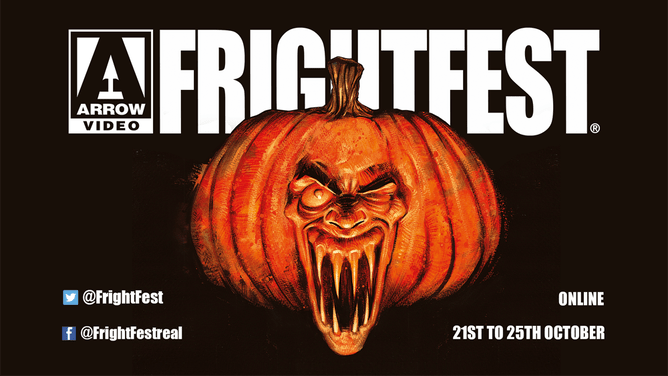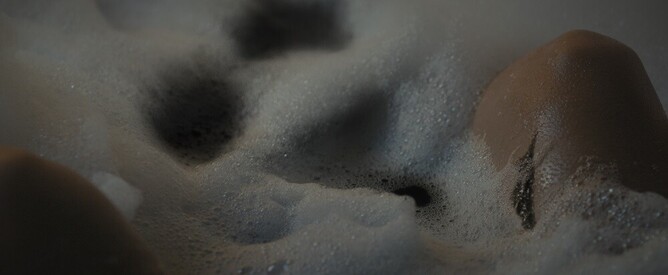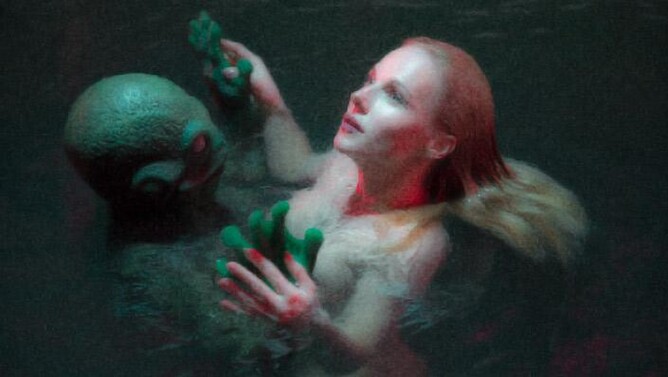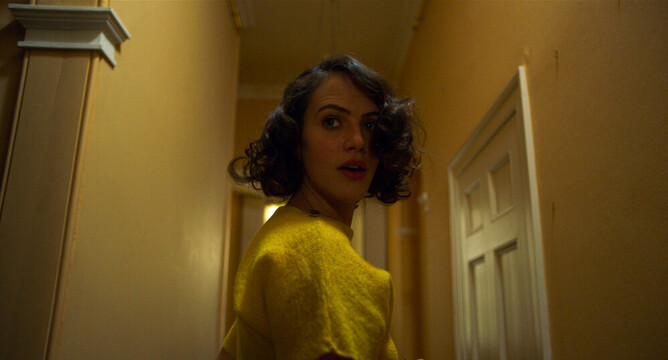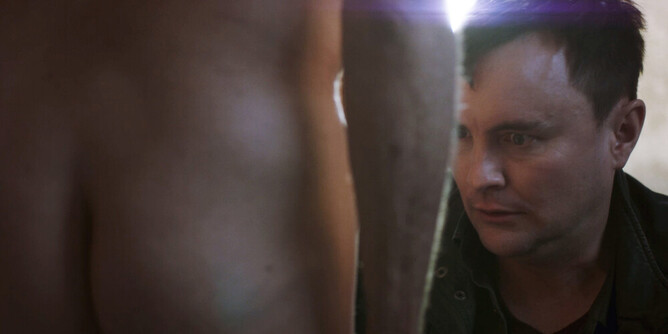Arrow FrightFest Digital Day 2 Reviews.
Stuart Wright looks at Day 2 of Arrow FrightFest Digital, with reviews of SACRIFICE, STRANGER aka STORONNIY, THE BANISHING and DEAD.
SACRIFICE
Directors: Andy Collier & Toor Mian.
Writer: Toor Mian,
Cast: Barbara Crampton, Sophie Stevens, Ludovic Hughes, Lukas Loughran.
UK
American couple, Isaac and his heavily pregnant wife, Emma, travel 1000s of miles to visit Isaac’s ancestral Norwegian home, on a remote island. At first locals want to fight Isaac, but when they discover who his father was, the aggression switches to deference. Island cop, played with convincing Norwegian tones, by scream queen, Barbara Crampton, shocks the couple with news of a 25-year-old, unsolved family crime – Isaac is rocked to his core, he had no idea. Their flying visit to sell the house turns on its head when Isaac begins to embrace island life, even partaking in their pagan customs. Emma keeps her eye on the prize – getting back to the USA to start a family is still her priority. In holding a grip on reality, Sophie Stevens (Emma) must run the emotional gamut for SACRIFICE. Her performance combines the heightened hormonal state of pregnancy, and the incredulity at the man she loves drifting away from her. All the while, Lovecraftian forces reaching over into our realm through her troubling nightmares. Like any good folk horror film, human sacrifice is always a possibility, and with a title like SACRIFICE, you’d be disappointed if it never delivered on that promise. Fortunately, Collier and Mian have more than enough up their sleeve to make the finale satisfying, dramatic and above all else, surprising.
STRANGER aka STORONNIY
Director: Dmitriy Tomashpolskiy
Writer: Dmitriy Tomashpolskiy
Cast: Anastasiya Yevtushenko, Darya Tregubova, Maria Bruni.
Ukraine.
The striking opening of a synchronised swimming team vanishing in plain sight of a 100+ crowd leaves no room to doubt it happened. Your expectations salivate at the prospect of how Dmitriy Tomashpolskiy’s film is going to solve this puzzle of puzzles. Enter female Inspector Gluhovsky to crack the case. This tenacious investigator has an unrivalled track record when it comes to finding missing people.
Realism combined with expressionism gives STRANGER a strong film noir feel as Gluhovsky goes where the evidence leads her, even if losing her mind is part of the process. The lion’s share of the investigation takes place at the Water Therapy Clinic #4 (WTC4) - a beauty spa of sorts. Nothing, and I mean nothing phases Gluhovsky as she’s looks for clues. Even a discussion about the earth being flat with a half man, half reptile, who refers to himself as the ‘Aquanaut Prophet’ doesn’t make her deviate or doubt herself.
The process driven staff at the WTC4 show no sign of guilt, or remorse in response to Gluhovsky’s probing questions. However, to expect truths to be unearthed is to trust Tomashpolskiy wants to simply inform the audience of what the hell is going on. Far from it. STRANGER slowly evolves into a sumptuous dream, right before your eyes. Where ever logic might be forming, Tomashpolskiy actively seeks out the eccentric and absurd to throw you off the scent. For example, a trip to the WTC4 library uncovers a book that provides meaning to your sneezes. It’s not the first Lynchian moment to find its way into this film as real and unreal become split personalities of Gluhovsky to work out about herself, as much as the case.
It’s a visually ambitious film that finds the majesty in brutalist concrete structures and bath taps alike. Inside WTC4, Tomashpolskiy creates suffocating levels of claustrophobia with darker hues of red and greens- blinds and curtains are almost always closed. The presence of an outside world vanishes from your thoughts.
STRANGER will beguile and flummox you in equal measure. Which will be frustrating for some, but more than enticing for those used to the rules of film noir. As Paul Schrader wrote in his 1971 essay on the subject, the how is more important than the what. And how Gluhovsky solves this case is very much about enthralling the audience along the journey, and never the outcome she reaches.
THE BANISHING
Director: Chris Smith
Writers: Dean Lines & Ray Bogdanovich, David Beton,
Cast: Jessica Brown Findlay, John Lynch, Sean Harris, John Heffernan.
UK.
Set in late 1930s Britain, just before the outbreak of WW2, Linus is the new vicar at a village church, the first to reside there for three years. The cold opening shows us the violent horrors that befell the previous incumbents, but his Machiavellian boss, Bishop Malachi, tells him they moved away to the sunshine of the colonies. Linus arrives with his wife, Marianne (Jessica Brown-Findlay) and adopted daughter Adelaide Anya Mckenna-Bruce. He’s a repressed individual, conflicted by his warped ideas of sin in the eyes of God and the natural feelings he has for Marianne. His bible’s teachings win out so it’s separate rooms for our newlyweds. They try to settle into this peculiar arrangement, but the vicarage has other ideas. Harry Price (Sean Harris) is the harbinger of doom with a firm belief in centuries old tales of the evil crimes, done in the name of religion, that are buried beneath Linus’s home. Naturally, he dismisses it as superstitious clap trap – the irony that a zealot believer in God would reject other beliefs so easily.
Inevitably, the brooding presence that exists in the vicarage moves to take what it wants (Adelaide) and eject everyone else. But Marianne is not your atypical vicar’s wife. She has lived a life without the fear of God in her heart. She challenges Linus’s authority and his religious doctrine. She asks the right questions, and seeks help from outside, as Adelaide becomes increasingly attached to the house and, heartbreaking for Marianna, rejects her as her mother.
Brown-Findley’s understated performance is excellent. She fights the church, logic and her own troubled mind to get her child back from the evil below. She is the foundation -pun intended – THE BANISHING is built upon. It’s in stark contrast to the big and bold presence of Harris who arguably steals the show with his wild-eyed, rebellious outsider, unafraid to confront evil in all its forms, but still maintains the sheen of calm and stiff upper lip of a true British hero. It’s as if writers Beton, Bogdanovich & Lines have concocted some sort of post-modern (or should that be post-Hammer) Peter Cushing character trope. When Marianne first meets him, it’s after he’s received a severe beating. Slumped against the wall of his bedsit, blood smeared over his face and hands he quips: “I must apologise. You find me at a low point.” I hope the writers who created him see the potential for his story to be continued.
THE BANISHING is a classy, period horror that oozes confidence in the directorial choices of genre stalwart Chris Smith. This kind of creepy story, emanating from past dirty-deeds, coupled with such a strong cast of oddball characters is what British horror does best.
DEAD
Director: Hayden J Weal
Writers: Thomas Sainsbury & Hayden J Weal
Cast: Thomas Sainsbury, Hayden J. Weal, Jess Sayer, Jennifer Ward-Leland.
NZ.
Marbles is the hapless loser character trope par excellence. He is single, his mother dominates him and his only real friend is his drug dealer. Fortunately, he has one defining quality though - he can see ghosts. He uses this special – narcotic fuelled – power to help grieving people say what they never got the chance to say and let their loved ones pass over into the next life. Below the surface of his apparent lethargy, Marbles has oodles to offer. When the ghost of Police Officer Tagg needs him to help solve his murder, he’s reluctant, but the offer of life insurance and the desperate need to save the family home from being sold means he has no choice. Irony of ironies, he still clings to the memories of his deceased father. The murder/mystery takes some wild turns to reach a wonderfully imaginative conclusion that speaks to the themes set out during the hunt for justice. In all the ridiculousness, Sainsbury and Weal’s warm script still manages to find the time to examine the complexities of loss, grief and love. This is set against the backdrop of Marbles, encouraged by Tagg and a blossoming romance with Emily Campbell’s fierce lawyer (and foster sister to Tagg) Petra, having his delayed coming age. Strictly speaking, for the purposes of classification, DEAD is a horror / comedy, but underneath the absurdity of talking to unsettled spirits, this is a heartfelt story about our ongoing connection with those that pass away. If SIXTH SENSE was a dramedy, it might look like this.
DEAD will be available on Digital Download in the UK 27th October 2020.
Click HERE for our latest Arrow FrightFest coverage.

